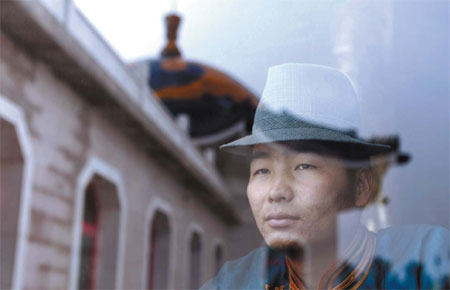A divine inheritance
By China Daily (China Daily)
Updated: 2014-04-05
|
Jinbao, a young man of the Darhad tribe in Ejin Horo Banner, the Inner Mongolia autonomous region, is a guard for the Mausoleum of Genghis Khan. China News Service |
Darhad man steps up to family's calling as guardian of Genghis Khan's mausoleum
For Jinbao, a 25-year-old man of the Mongolian ethnic group, every day looks the same, but is equally solemn and sacred.
His mornings begin with the chanting of eulogies to his "Emperor Lord" in the mist of burning incense inside the Mausoleum of Genghis Khan in Ejin Horo Banner, the Inner Mongolia autonomous region.
Jinbao is of the Darhad tribe, who are descendents of two leading generals of Khan's Mongolian army, Bo'orchu and Muqali.
The two soldiers stood as guards of the mausoleum after Khan's death in 1227.
Like his ancestors, Jinbao is a mausoleum guard.
Though no one knows exactly where the great Khan was buried, the mausoleum, which houses some of his lifetime belongings, is considered by the Mongolian people to be one of the world's most sacred places.
In 1939, Jinbao's grandfather guarded the mausoleum as it was moved westward to protect it from a possible Japanese invasion.
The building that stands today was built in the 1950s on the original spot of Khan's tomb, and historic relics from eight scattered white yurts were moved into the new mausoleum's three golden palaces.
"When I was in high school, my father asked me and my two brothers which of us wanted to become a mausoleum guard. Only I immediately agreed," Jinbao was quoted by the China News Service as saying.
To him, the decision to inherit his family's tradition was simple. He is the 40th generation of the Darhad people and to date, the youngest guard among the mausoleum's 30-person full-time squad.
There are about 6,000 Darhad people living in Ejin Horo, a county-level administrative district in the region, but most have switched to other jobs.
Darhad guardians have kept an oil lamp in the palace burning for nearly 800 years. Jinbao scrupulously makes the lamp wick out of dried straw and cotton - his most important duty.
The mausoleum's busiest times of the year fall on Lunar New Year and Tsagaansurek, the peak day of a one-week annual spring sacrifice, which falls on the 21st day of the third month of the lunar calendar.
During these special occasions, the Darhad tribe hosts dozens of rites and sacrifices for tens of thousands of pilgrims.
However, most of the time, Jinbao and other Darhad guards quietly stand watch, while keeping the visitors away from the lamp table and making sure the palace is clean.
"Our job takes patience. Someone who gets lonely easily may not be the most suitable candidate," he said.
He lives with his family in the nearby countryside and raises cattle.
He met his wife, also a Darhad, while he was taking a class at a university in Hohhot, the capital of Inner Mongolia. They married in 2012.
He bought a house near the mausoleum, but had lived with his parents before the new lodge finished renovation.
"Every time I find a book about Genghis Khan, I buy it," Jinbao said, explaining piles of books crowding his desk. "But I've only read bits and pieces of them.
"Safeguarding the mausoleum will be my lifetime duty," he said, adding that he looks forward to having a baby son.
"In that way, I can pass down the family profession of keeping our god safe."

High-speed train debuts in Inner Mongolia
A bullet train departed Hohhot East Railway Station for Ulanqab marking the start of high-speed rail services using Inner Mongolia’s first newly-laid high-speed railway on Aug 3.

